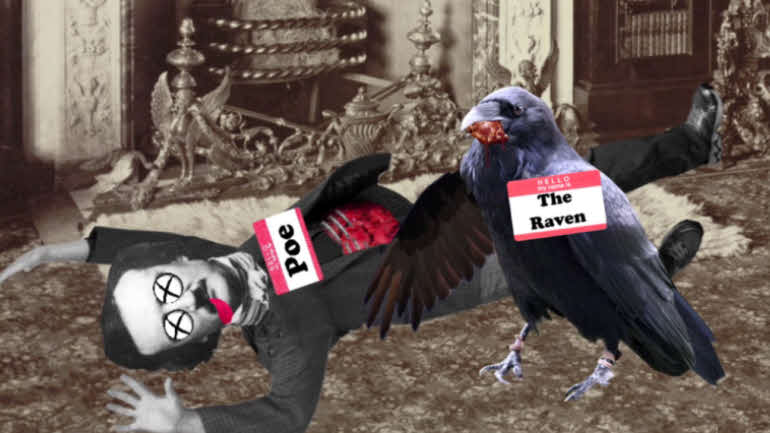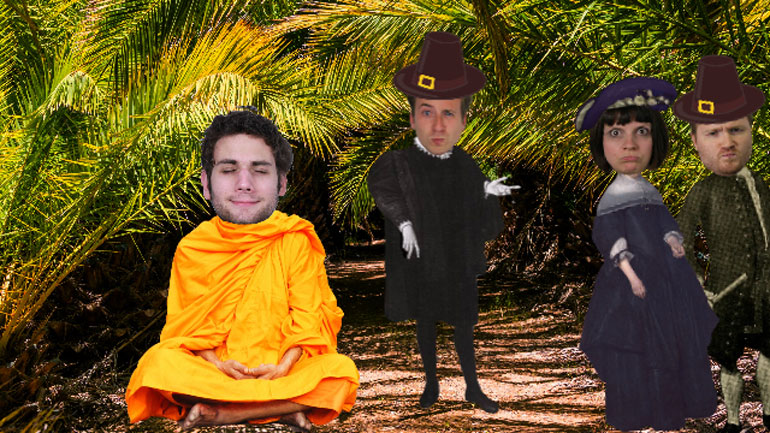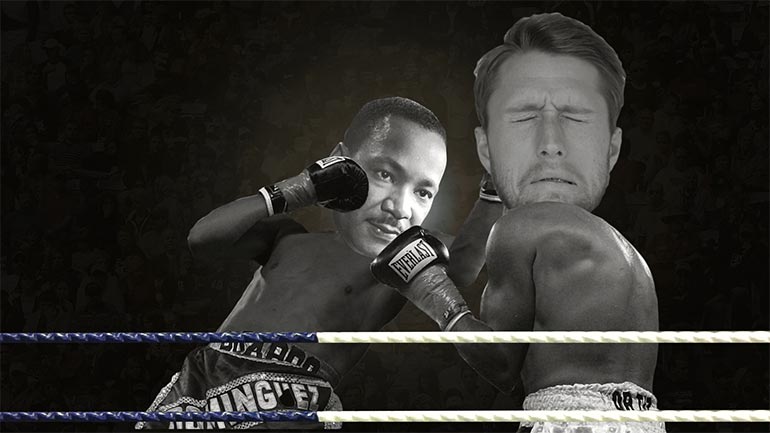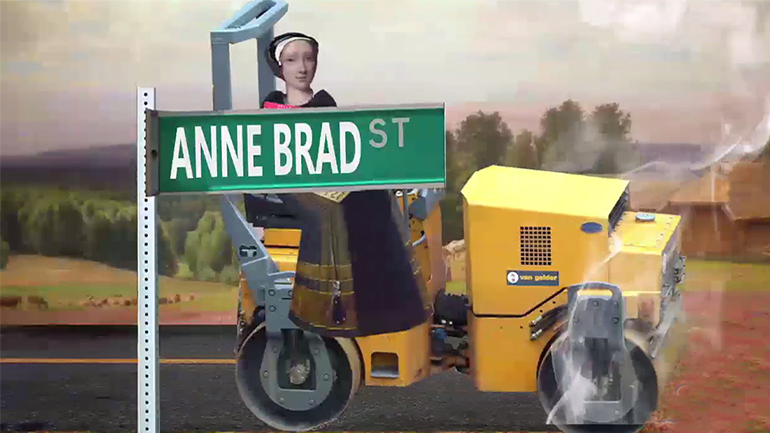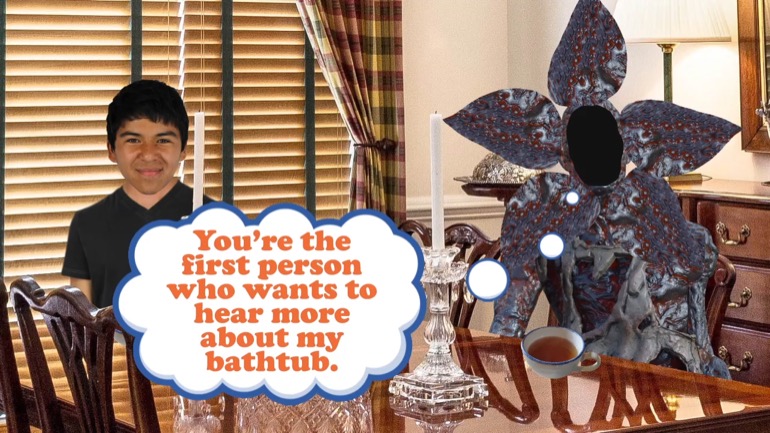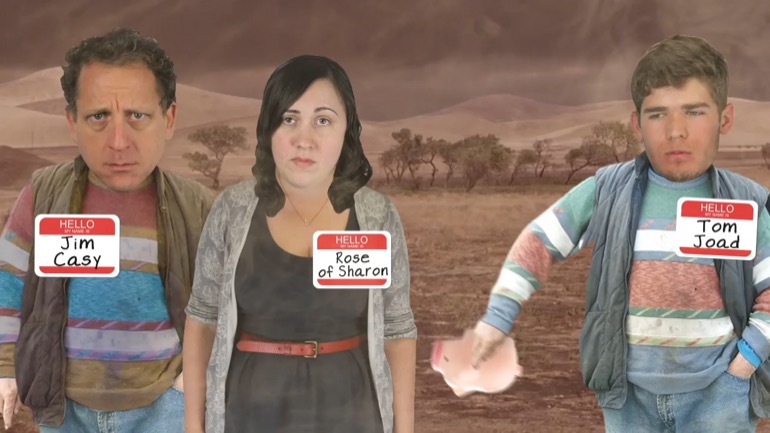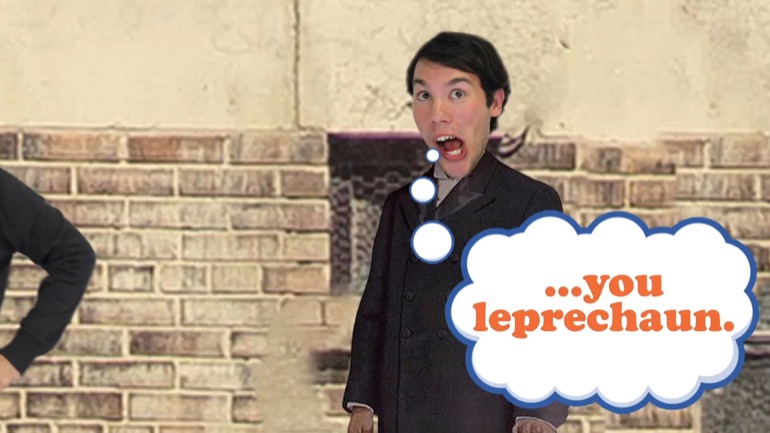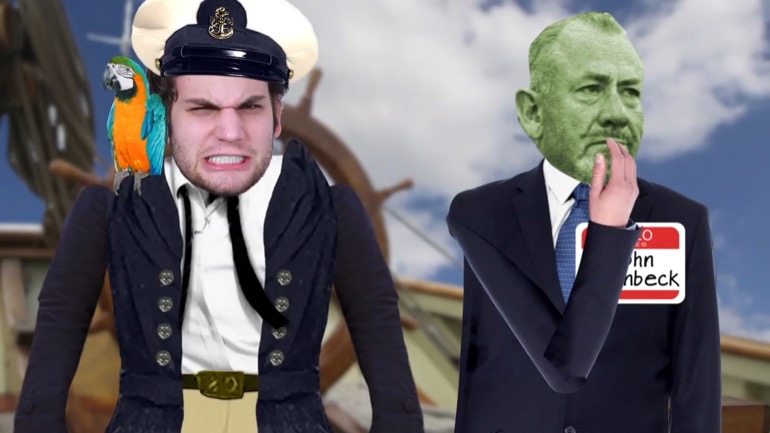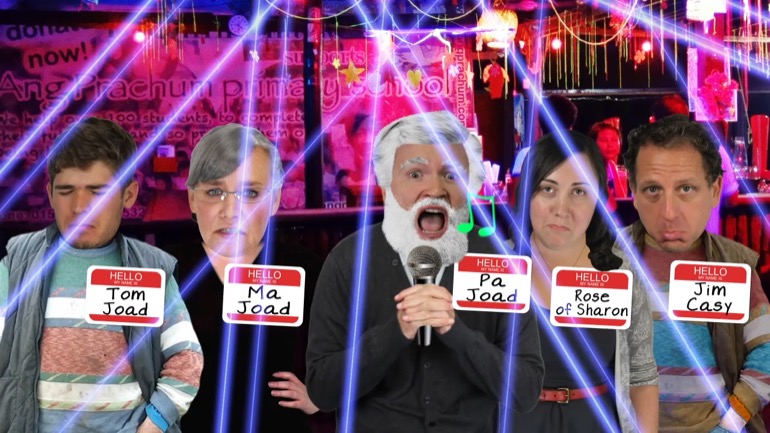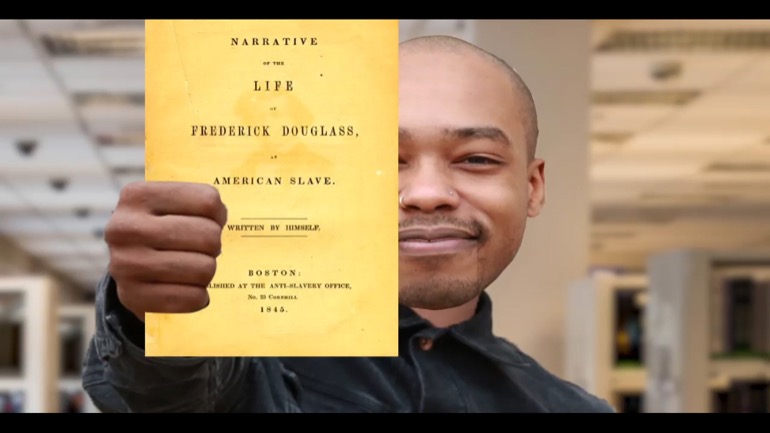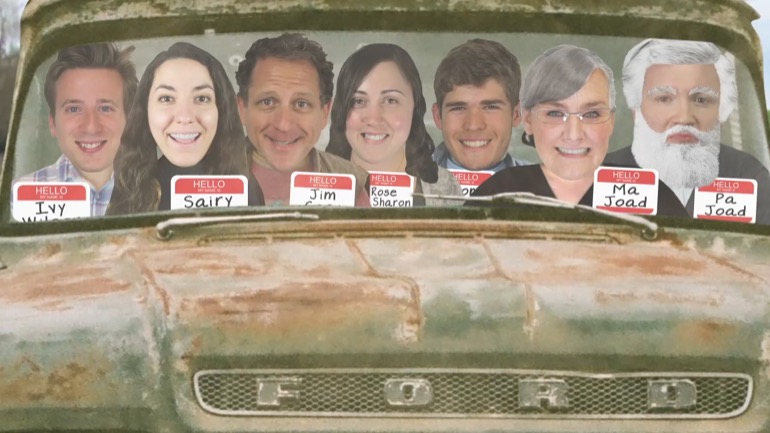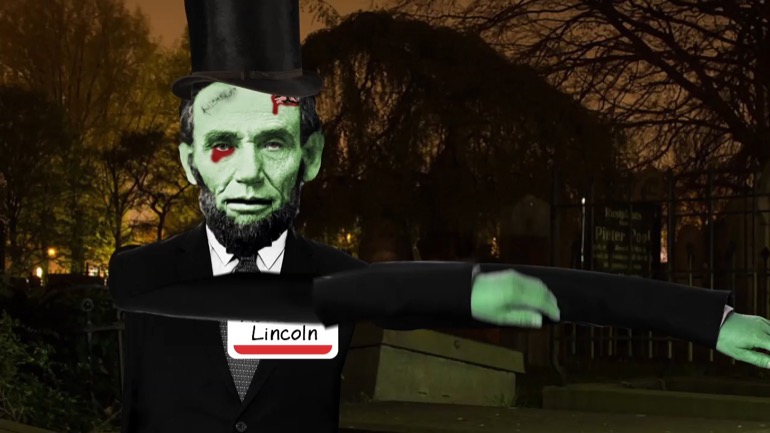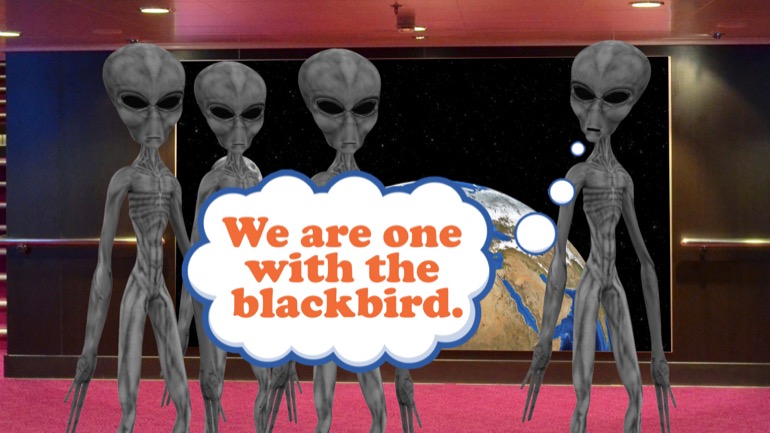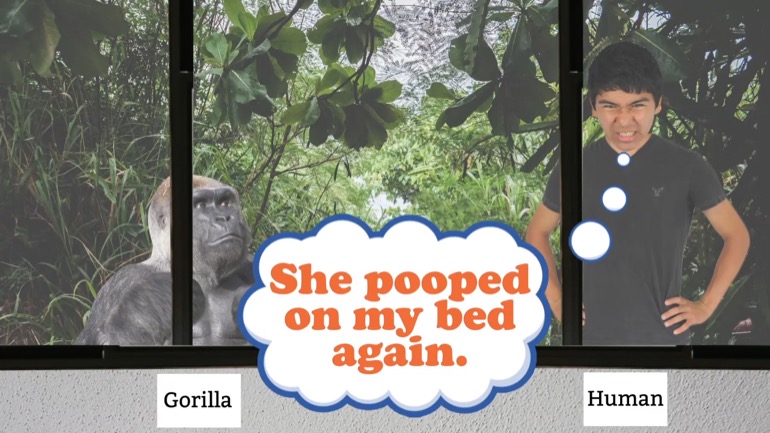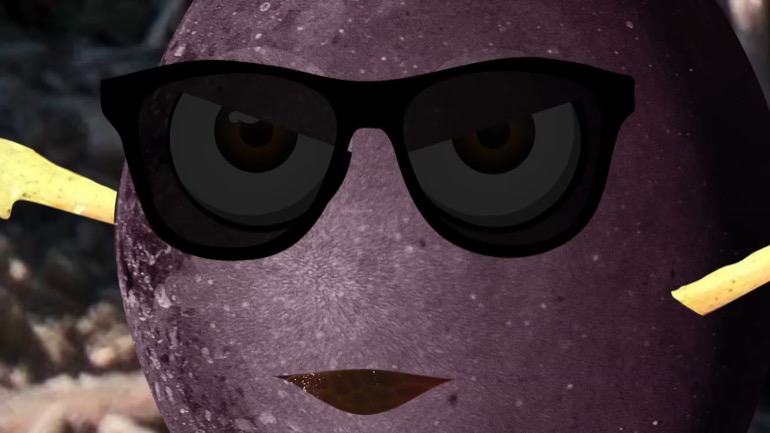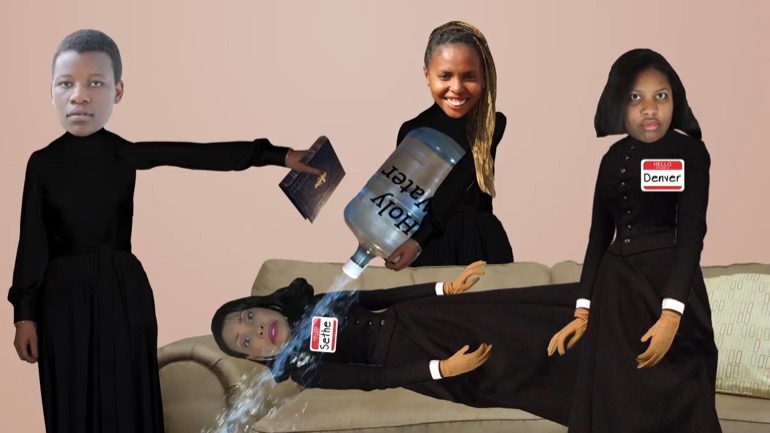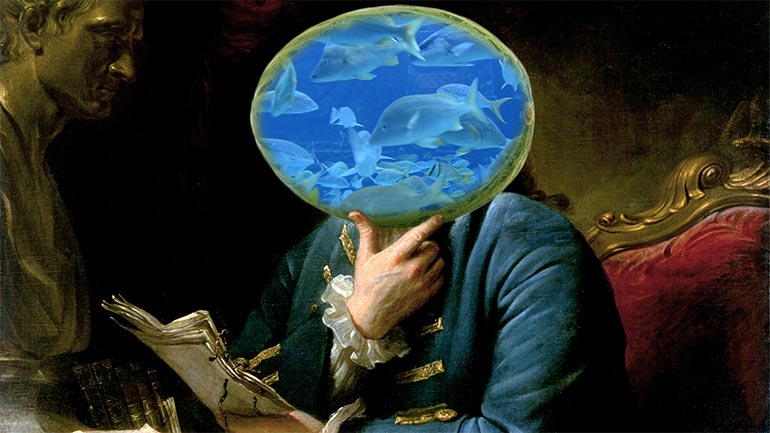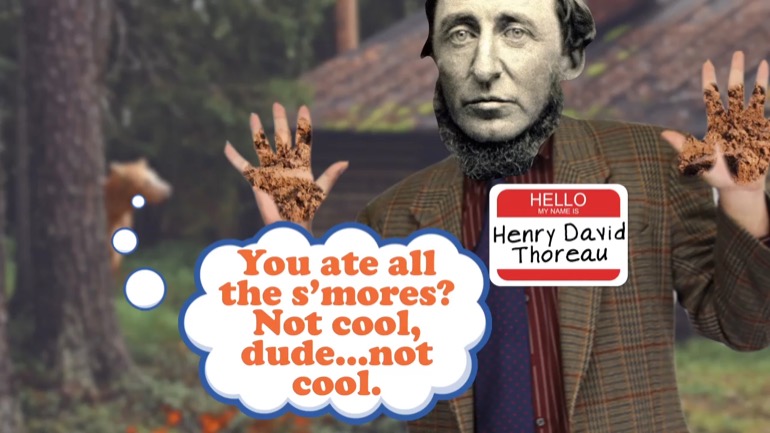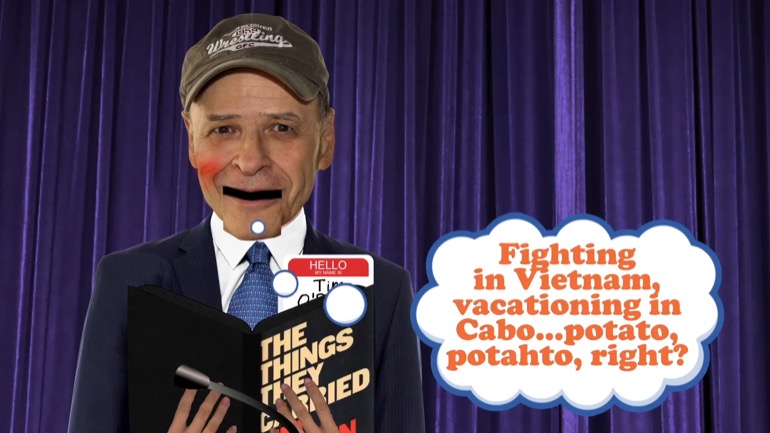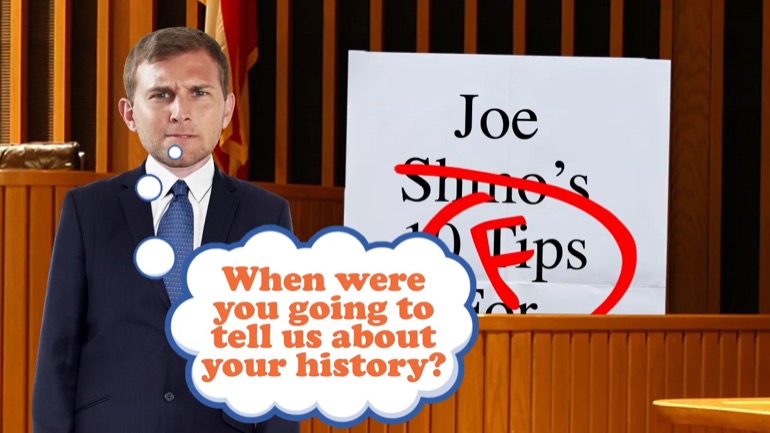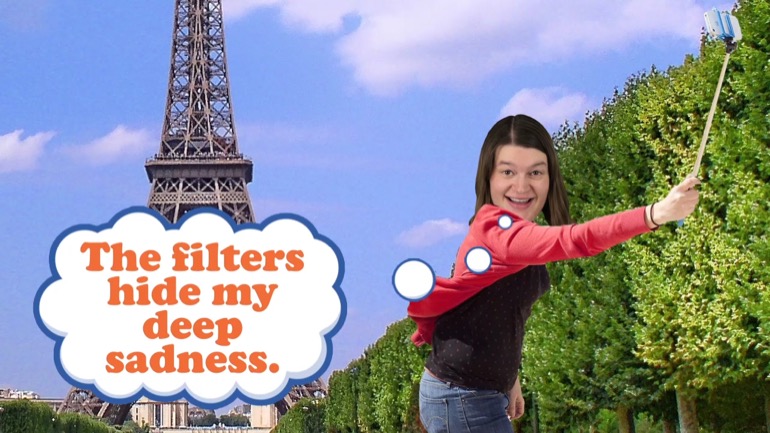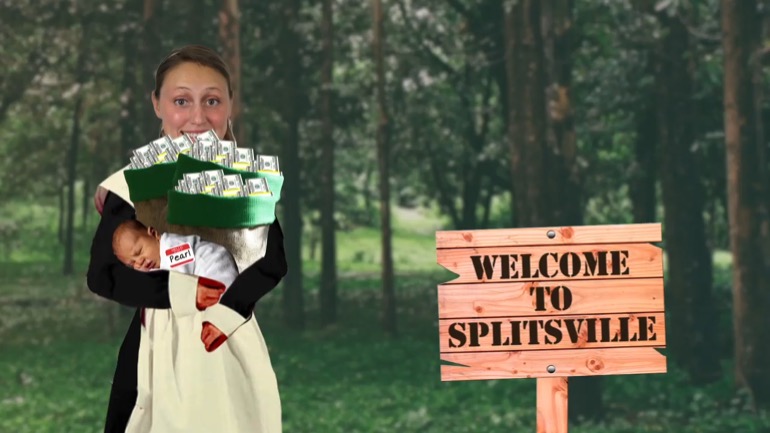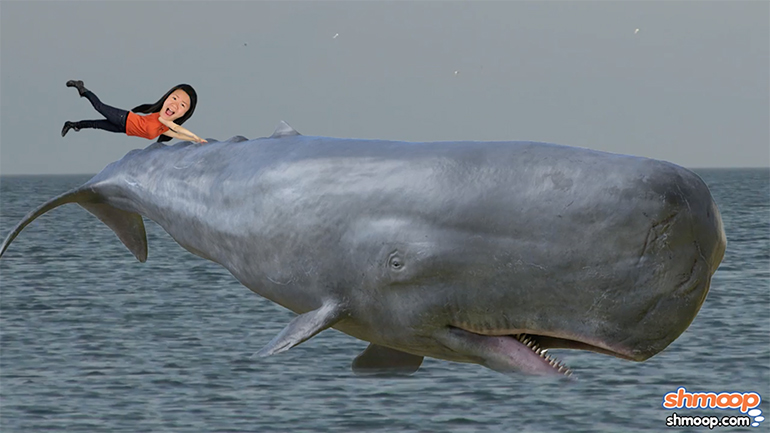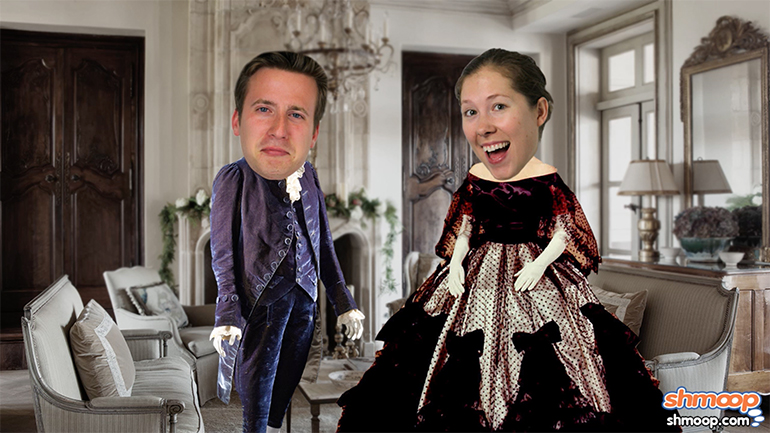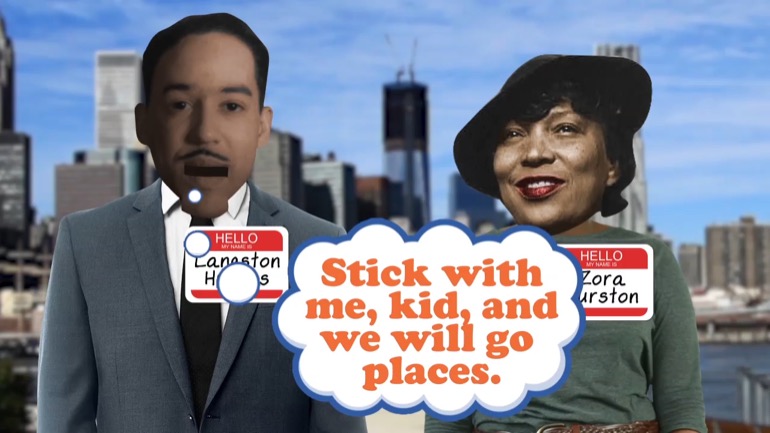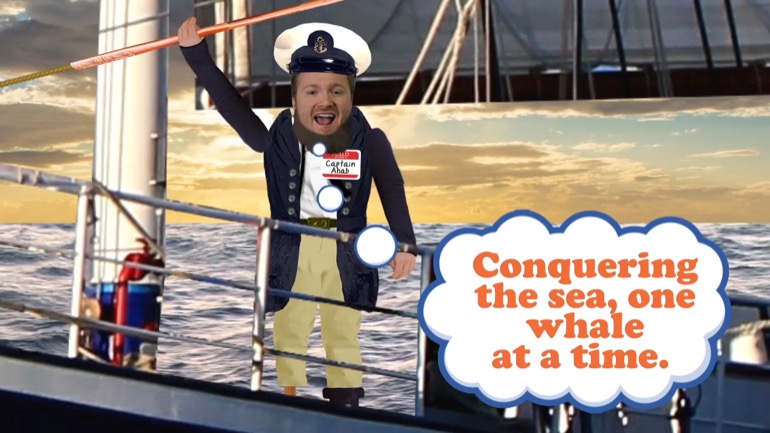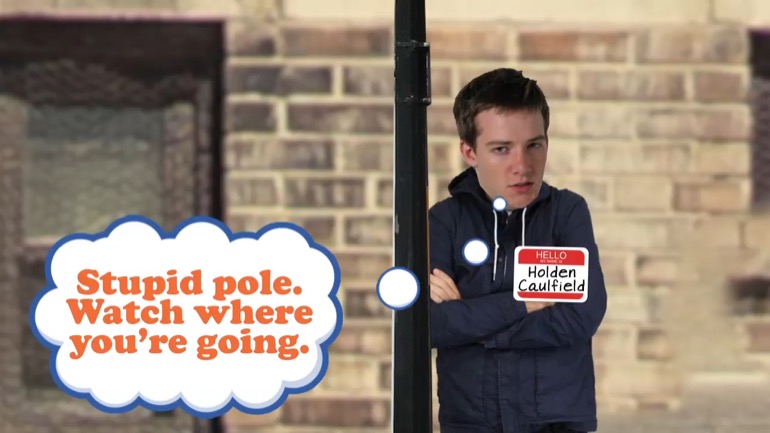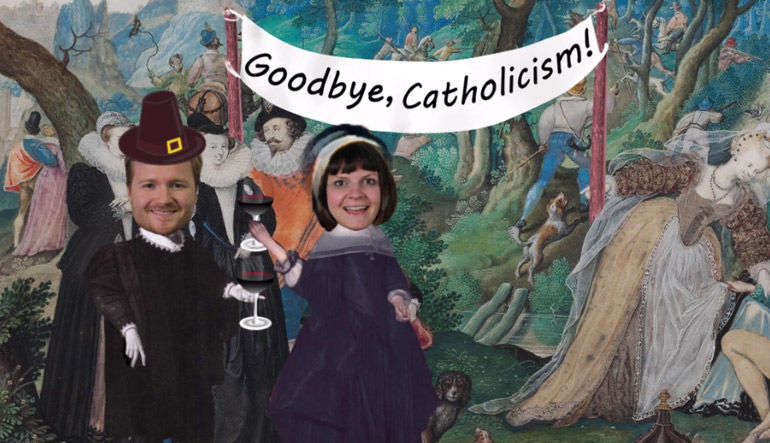ShmoopTube
Where Monty Python meets your 10th grade teacher.
Search Thousands of Shmoop Videos
Courses Videos 906 videos
How are risk and reward related? Take more risk, expect more reward. A lottery ticket might be worth a billion dollars, but if the odds are one in...
What's a dividend? At will, the board of directors can pay a dividend on common stock. Usually, that payout is some percentage less than 100 of ear...
What is bankruptcy? Deadbeats who can't pay their bills declare bankruptcy. Either they borrowed too much money, or the business fell apart. They t...
American Literature: Sontag and Updike 13 Views
Share It!
Description:
Ready to learn about Susan Sontag and John Updike? Just want to hear the word "rabbit" a bunch of times? We've got you covered on both fronts, even if one of those fronts is oddly specific...
Transcript
- 00:03
Susan Sontag and John Updike....
- 00:35
work it work it come on make it fierce beautiful that's the shot now off you go [Man being photographed and walks away]
- 00:41
Alfonso he's going to be a star right you want to know who was the real star
- 00:45
though Susan Sontag, Sonntag was born in New York City in 1933 after establishing [Susan as a baby crying in a cot]
- 00:52
herself as a writer she burst into the big leagues with her 1964 essay notes on
Full Transcript
- 00:58
camp, it's not about making out on a bunk bed with your summer crush but is
- 01:03
instead about camp the style which is an overly exaggerated and intentionally
- 01:08
cheesy aesthetic that was first defined in the early 1900s Katy Perry's 2015 [Katy Perry performing at a concert]
- 01:13
halftime show performance that featured a giant robot tiger and several dancing
- 01:17
sharks yeah that's camp ridiculous B movies
- 01:20
like sharknado they qualify as camp too, over the years
- 01:24
Sontag gained fame for her nonfiction work including against interpretation [Sontags document appears]
- 01:30
and other essays illness as metaphor and the George Polk award winning collection
- 01:35
of essays on photography which we'll be looking at shortly and don't think
- 01:39
that's the only trophy she's got mounted on her wall Sontag also won the [Unicorn head mounted on a wall beside Susan]
- 01:44
National Book Critics Circle Award earned a MacArthur Fellowship and even
- 01:48
won the National Book Award for her 2000 novel in America... Sonntag basically had
- 01:54
her dream job she was a public intellectual [People cheering for Sontag]
- 01:58
okay okay so public intellectual is just another way of saying writer but it sure
- 02:03
makes Sontag sound cool besides notes on camp Sontag is best
- 02:07
known for her 1977 essay collection on photography don't think the book is a
- 02:12
guide to taking selfies or something instead it's about understanding photos [Girl attempting to take selfie with Eiffel Tower]
- 02:17
though it certainly wouldn't hurt your selfie skills to read it in the essay
- 02:22
Sontag argues that seeing images of something desensitizes us to it no
- 02:27
matter how shocking it might be to us at first we can apply this rule to violent
- 02:31
imagery after seeing 10,000 more of these images the 10,000 at first isn't
- 02:37
going to seem too shocking to you is it kind of like a mortician who isn't [Mortician walks into lab room]
- 02:41
grossed out by the time he gets to his 500th corpse the same goes for sexual
- 02:46
imagery or any of the weird stuff you stumble across on the Internet the first
- 02:50
essay in the collection is named after Plato's cave a famous thought experiment
- 02:54
by the philosopher Plato no not the clay Plato compares Humanity to prisoners [People chained up to a wall]
- 02:59
locked up inside a cave forced to watch a shadow puppet show all day every day
- 03:04
because they've never known anything about the cave these people think that
- 03:08
the shadows are the real objects and have no sense of the actual things producing
- 03:13
those shadows they don't even know that concept of shadows [People holding up animal ornaments]
- 03:17
Plato use this thought experiment to illustrate how our senses aren't enough
- 03:22
to fully comprehend reality but Sontag twists it here to represent our [Waiter gives woman a menu]
- 03:27
relationship with images after all like shadows photographs aren't the same as
- 03:32
the things they're representing though it can be easy for us to feel that way
- 03:36
sometimes hey maybe we've discovered the reason [Man chewing a photograph]
- 03:39
images desensitize us they make us feel like we're experiencing something even
- 03:44
though we're not here's how Sontag frames it in the opening essay....
- 03:57
Look at all those words she associated with photography appropriate
- 04:02
object acquire in other words to take a photograph isn't just to document the [Woman holding a photograph and falls over]
- 04:07
subject matter but to possess it possession as an ownership not the a
- 04:12
possession of the demonic variety now we don't just mean that you feel a sense of
- 04:17
ownership over the photograph or jpg or whatever but the actual objects being
- 04:22
photographed and the moment in time when the image was taken a similar thing
- 04:27
happened with other types of art like novels or painting but there's a big [Man inspecting a piece of art]
- 04:31
difference we know that a novel isn't a perfect reflection of reality after all
- 04:36
it's just a bunch of words on a page the same goes for paintings simply by the [Young girl painting a picture]
- 04:40
fact that they're paintings we can tell that someone had to paint them but
- 04:44
photographs are different because they're pretty much exactly what we see
- 04:48
with our own two eyes it's easy to think that they perfectly reflect reality
- 04:53
which is completely untrue....
- 05:06
as Sontag says we automatically
- 05:08
assume that photographs have a sense of authority as in we assume the
- 05:12
photographer is knowledgeable about the subject matter they're photographing it
- 05:16
would be much better in our eyes for example for a zoologist to be taking [Gorilla beating its chest and photograph is taken]
- 05:20
anatomical photos of animals rather than a plumber we also assume that photos are
- 05:25
truthful we don't want someone taking a photograph of a dog and telling you it's
- 05:29
a cat or telling you that they took a picture in New York City when it was
- 05:33
really actually taken in Topeka Kansas of course we have no real guarantee that
- 05:38
a photographer is keeping it 100 with us they might for example have posed the
- 05:43
subjects before snapping the photo as was the case of Jacob Riis; a famous [Woman posing for a photograph]
- 05:47
crime photographer who would pose his subjects to make them seem as destitute
- 05:51
as possible to emphasize his anti-poverty message in the digital age
- 05:56
we also have to consider editing we can see examples of manipulative editing all
- 06:02
over the place from the cover of celebrity magazines to propaganda images
- 06:06
from the North Korean military which are [North Korean soldier marching]
- 06:08
haphazardly photoshop for a maximum intimidation value sometimes it isn't
- 06:13
about the photograph itself but its context this happens online all the time
- 06:18
someone posts an image of a person in a real life or death situation claiming [Image of man scared by a burning builder]
- 06:23
that it's a real-life photo only for it to turn out to be a still from a
- 06:27
big-budget movie but we don't see any of that manipulation if we see a photograph
- 06:32
we assume it's true Sontag seem to have predicted our image
- 06:36
saturated smartphone dominant future right check out this bit for example [Person waves hand over crystal ball]
- 06:41
here Sontag argues that books are not the best place to see photographs.....
- 06:50
....and why because they're too linear
- 06:55
in other words when you look at a book of photographs you move through the [Book pages turn]
- 06:58
pages in a straight line from beginning to end, fast forward about four decades
- 07:03
and what device changes all of this you got it smartphones with smartphones you
- 07:08
don't have to look at photographs in any particular order whether we're using
- 07:12
snapchat Instagram or simply surfing the web we can look at photos in any order [Person searching the internet for vacation spots]
- 07:17
we want or however long we want I tried to explain this to Alphonso but it was
- 07:23
too much for his little noggin to handle cut him some slack
- 07:26
he's a model not a quantum physicist another forward-looking bit from on [Quantum physicist appears in classroom]
- 07:30
photography are these comments about camera technology....
- 07:44
The gist is that falling prices and improved technology allowed
- 07:48
the masses to just start taking photos themselves leading to the development of
- 07:52
photography as a legitimate art form at first cameras required a huge setup [Man stood beside an olden camera]
- 07:57
and professional training to operate before eventually becoming smaller and
- 08:01
cheaper with each passing year of course when this essay was written the easiest
- 08:06
camera someone could pick and shoot was a Polaroid a camera that let you develop
- 08:10
photos instantly but we've got a lot more choices today like inexpensive [Selection of modern cameras appear]
- 08:15
digital cameras smartphones and even our computers many of which have cameras
- 08:20
built-in so if we apply Sontag's argument to modern technology we gain a better
- 08:25
understanding of why photography is everywhere these days
- 08:28
prices go down technology goes up and people start taking photos like mad but [Woman taking photo of cat lying on a couch]
- 08:34
Sontag wrote about more than just photography another important essay in
- 08:37
our arsenal is titled on American language and culture big shocker it's
- 08:42
about American language and culture hey at least Sontag is straightforward the [Sontag sitting by a window]
- 08:46
essay starts by focusing on Sontag hometown of New York City which she
- 08:51
describes as distinct from the rest of the country due to its foreign nature to
- 08:55
be fair pretty much everything about America is foreign when it comes down to
- 08:58
it most citizens are descended from immigrants after all even the food comes
- 09:03
from elsewhere pizza Italy hotdogs Germany Mountain Dew somewhere in outer [Astronaut with a can of Mountain Dew in outer space]
- 09:08
space we assume but NYC is different Sontag explains... New York has such a
- 09:13
significant foreign-born population that it just feels different from the rest of
- 09:18
the country Sontag explores this concept further when she talks about how
- 09:22
a Swedish member of the Nobel Prize Committee commented on the literary
- 09:26
taste of foreign writers which given that Sweden is an itty bitty country [Sweden appears highlighted on a globe]
- 09:31
accounts for like 99.9 percent of the world population so foreignness can mean
- 09:37
different things depending on the context it can refer to something worth
- 09:40
treasuring like it is for Sontag or it can refer to something that's viewed
- 09:44
suspiciously Sontag repeatedly uses the word dialectic to make this point which
- 09:50
refers to the balance of two contrary ideas in this case the dialectic [Paragraph from American language and culture novel]
- 09:55
between Americans pride for their foreign heritage and their simultaneous
- 09:59
distrust of foreign people in most situations it's like they can appreciate
- 10:03
the idea of foreignness the idea that their ancestors traveled here from a
- 10:08
distant land but simultaneously look down on the foreign people they [Man standing at a bar and is punched in the face]
- 10:12
encounter in their lives Sontag also relates America's unique
- 10:16
relationship with foreignness to the English language itself.....
- 10:26
and how shockingly few foreign language literary works are translated into
- 10:31
English Sontag relates this idea to the fact that English is now the dominant
- 10:36
language in the world which means that it doesn't have to worry about all those
- 10:39
other small-fry foreign languages she also mentions how American culture is [English Dictionary appears]
- 10:44
defined by doing things differently from the past which naturally would lead
- 10:49
Americans to focus less on translating foreign literature than making their own
- 11:03
then Sontag sticks the knife in with the closing passage arguing that this [Knife lands in piece of paper]
- 11:09
unique American mindset causes the country to distress anything of too high
- 11:14
of quality distrust intellectualism and generally act like a bunch of uncultured
- 11:20
schmucks someone has never watched reality TV, thats quality and
- 11:25
intellectualism in one tidy package next step will be looking at Sontags essay [Person watching the Bachelor on TV]
- 11:30
regarding the pain of others, which covers the always lovely concept of war
- 11:35
she begins by quoting a piece by famed feminist writer Virginia Woolf
- 11:39
in this piece Woolf argues that war is obsolete and barbaric that men not women
- 11:45
cause wars and that Han definitely shot first and guess what's used as a focal [Han shoots gun and Han and Chewbacca hold arms up]
- 11:50
point for the essay, a photograph specifically a gruesome war photo of
- 11:55
dead civilians that Virginia Woolf wrote commentary for
- 12:05
Woolf wrote this commentary to prove that men and women saw armed conflict the
- 12:09
same way which was a roundabout way of arguing against the existence of war [People protesting the end of the war]
- 12:14
itself what's interesting is that Woolf's analysis of the photo revolves around
- 12:19
how she can't figure out what she's looking at if you need any indication of [Virginia looking through magnifying glass]
- 12:23
how nasty the scene is this in comprehensibility represents the chaos
- 12:29
of war and Woolf happens to believe that war is fundamentally wrong... Sontag
- 12:35
she's a little more cynical due maybe to the 50-year gap between the two women's
- 12:40
births Sontag has serious doubts that war will ever really end and argues that [Army soldiers marching in battle]
- 12:45
we should instead focus on protecting human rights
- 12:48
stopping genocide and generally keeping armed conflicts as civil as possible
- 12:52
before you go I have one last friend I want to introduce you John Updike born
- 12:58
in 1932 Updike wasn't raised in the big city like Sontag but the quaint town of
- 13:03
Reading Pennsylvania Updike went to college for cartooning oddly enough [Updike walking through corridor and holds cartoon art]
- 13:07
beginning his writing career as a contributor to The New Yorker after
- 13:10
graduation in particular Updike is known for his rabbit series of books a set of
- 13:16
four novels following average middle-class American Harry Rabbit
- 13:20
Engstrom through his whole life rabbit a former high school basketball star seems [Basketball lands in a hoop]
- 13:25
to go through a midlife crisis every few years and his trials and tribulations
- 13:29
end up reflecting American society back at itself the series begins with 1960s
- 13:35
rabbit run which follows rabbit at 26 years old as he struggles to move past [Rabbit walking through school corridor]
- 13:40
his high school glory days destroys his relationship with his wife Janice and has
- 13:44
an affair with a prostitute named Ruth who he also impregnates, hmm wonder if
- 13:49
those last two have anything to do with each other
- 13:51
in 1971 Updike released rabbit redux which follows 30 something year old [Rabbit driving a car]
- 13:57
rabbit in the throes of a midlife crisis his second if your keeping count his
- 14:02
wife has just left him for another man and he's stuck working manning the line
- 14:06
at an industrial printing press yikes this one takes place in the 60s so
- 14:10
a lot of it has to do with the huge cultural changes going down at the time
- 14:15
like the hippie movement the moon-landing and the Vietnam War and guess
- 14:19
what happens in 1981 rabbit is rich our boy gets rich and how? well he [Rabbit bathing in cash]
- 14:26
inherited a Toyota dealership from his wife's dad Janice that is she's back in
- 14:31
the picture after her extramarital shenanigans last time around of course
- 14:35
rabbit being rabbit he pays her back in kind with some extramarital shenanigans [Rabbit and Janice in bed together]
- 14:40
of his own 1990s rabbit at rest finds our hero if we can call him that
- 14:45
in his worst state yet depressed overweight and unhealthy and retired in
- 14:51
Florida he has a near-death experience at the beginning of the novel when he [Rabbit falls over while fishing]
- 14:54
has a heart attack while fishing given this new lease on life rabbit well he
- 14:59
has another affair rabbit is going to do what a rabbit's going to do at the end
- 15:03
he has another heart attack this time while playing pick-up [Rabbit having heart attack and young boy appears]
- 15:07
basketball with some youngsters and this one puts him down for the count
- 15:11
Updike was a serious literary titan in his time winning a staggering two
- 15:17
Pulitzer Prizes for fiction one for rabbit is rich and one for rabbit at
- 15:21
rest nobody besides William Faulkner and Booth Tarkington won the Pulitzer Prize
- 15:26
more than once making Updike a serious contender for [Updike on stage and title for greatest of all time appears over his shoulder]
- 15:30
the GOAT of 20th century American literature like Sontag, Updike was a
- 15:34
major intellectual figure of his era and continued writing up until his death in
- 15:38
2007 well I hope you walk away with some new knowledge that'll help you down the
- 15:43
line like for example that Susan Sontag is
- 15:45
one of the most important American intellectuals of the 20th century if not
- 15:49
the most important it's pretty easy to see why when we look at our essay
- 15:53
collection on photography that book is so forward-thinking we wouldn't be
- 15:57
surprised if it uses the word snapchat at some point we can see John Updike as [John Updike receiving a prize on TV]
- 16:01
another major American intellectual of the era his rabbit series provides
- 16:05
decades spanning commentary of the changes to American culture that
- 16:09
occurred over that time period now I hate to be rude but I really must get
- 16:13
back to work who knows what Alphonso got up to while
- 16:16
we were chatting oh Alphonso, oh no he forgot where the food goes again so what [Alphonso appears with hotdog on his head]
- 16:22
can you do with a face like that you really can't be too picky
- 16:28
you
Related Videos
“Happy Hunger Games!” Or not. Katniss’s Hunger Games experiences left a not-so-happy effect on her. This video will prompt you to ponder if...
Who's really the crazy one in One Flew Over the Cuckoo's Nest? Shmoop amongst yourselves.
Sure, Edgar Allan Poe was dark and moody and filled with teenage angst, but what else does he have in common with the Twilight series?
¿Por que es el 'Gran' Gatsby tan gran? ¿Porque de su nombre peculiar? ¿Porque de el misterio que le rodea? Se ha discutido esta pregunta por muc...
Would would the world be like without books? Ray Bradbury tackles that question—and many more— in Fahrenheit 451. Go ahead; read it on your Kin...



